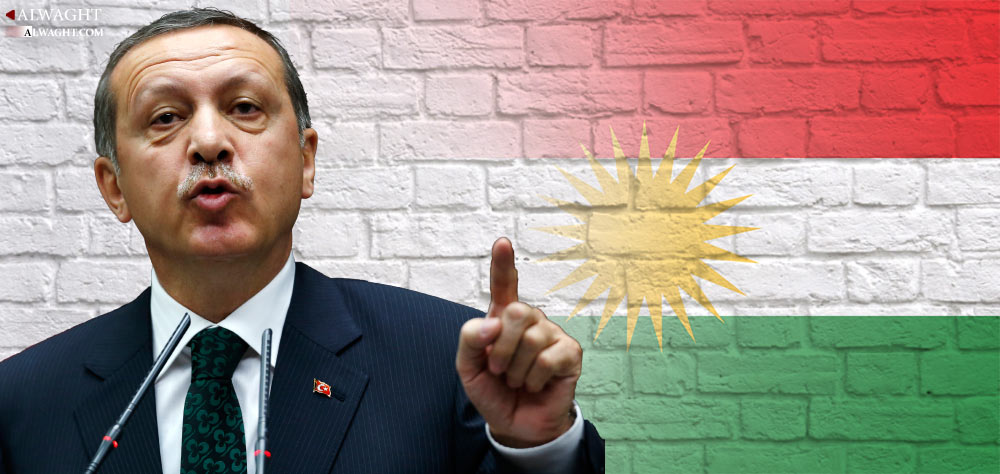Alwaght- In the recent days, especially before and after Turkish President's last week visit to Iran and negotiations with top Iranian officials, the Turkish media reported that Ankara was struggling to design a roadmap aimed at confronting the independence referendum of the Iraqi Kurdistan region. Earlier, the senior Turkish officials had asserted that they will take steps to seriously face the northern Iraqi Kurds' breakaway vote by an accurate and strategic plan.
Now the question is that how is the Turkish President Recep Tayyip Erdogan's roadmap expected to carry procedures to help Ankara force-stop the Iraqi Kurds' bid for independence? How is it practical in various levels?
Here are the two ways the Turkish plan could help contain the independence referendum's aftermath.
Short-term strategy: Economic blockade in association with Iran
A short-term strategy of the Turkish leader against Kurdistan Regional Government (KRG) could contain steps to punish Erbil, including closure of the borders with Iraq’s north. In the meantime, the Iraqi government will continue its punitive economic measures against the autonomous region, and on the other hand will push for negotiations for an exit from the crisis and guaranteeing the unity of the Iraqi territories. Odds are that Baghdad will make some concessions to the KRG including implementation of the constitution's Article 140 that asks the government of Iraq to take measures to reverse the Arabization policy of the former Iraqi dictator Saddam Hussein who relocated thousands of Kurds from disputed areas. More concessive steps might include allocating 17 percent of Iraq’s national annual budget for the Kurdistan region and also paying total amount of the Erbil budget that has been cut for nearly three years after KRG decided to export oil independent of Baghdad.
But Turkey puts premium on partnership with Iran. It wants Iran to take coordinated actions in opposition to the Kurdish intentions to break up with Iraq. So far, the two countries have imposed an air blockade on Erbil as an initial stage of counter-split strategy, and land borders closure appears to come next as an option. Once the two neighbors decide to tighten the noose on Erbil, Ankara will shut down the major lifeline to the Kurdistan region, the Ibrahim Khalil border market as well as the Habur border crossing, and possibly will ask Iran to close its major border points with Iraq's north, including Parviz, Bashmakh, and Tamrchin.
Next, Turkey will seek addressing its energy needs that once were met by the Kurdistan oil exports to its neighbor. Iran will probably be the alternative supplier, with the Iraqi government expected to shoulder part of the additional costs imposed on Turkey because of the Kurdish oil supply cessation. A full air and land embargo looks to some extent likely and practical if Tehran and Ankara agree on its arrangement. However, Ankara expectation from Baghdad to compensate for Turkish cancellation of the Kurdish energy supply and from Tehran to play role of a substitutive oil supplier will be viewed as excessive privileges demanded by the Turkish government that make the plan implementation face some complications. In fact, the Turks will appear as the top gainers through their excess if the concessions are made to Ankara. However, some alterations could be introduced to the modality and the three parties of Iraq, Iran and Turkey will make it to a stable accord on joint work.
Long-term strategy: Security and military pressures on Erbil through Baghdad
An advanced level of the Erdogan’s anti-secession arrangement might push Turkey to cooperate with the central Iraqi government to put military and security strains on Erbil leaders. In other words, if the Kurdish region declines to back down on its secessionism, there is possibility of using force by the Iraqi army to push Erbil to the wall. This means that Tehran and Ankara will offer advisory and military backing to the Iraqi forces' push to retake the “disputed regions.” The army within several months can bring under its control the disputed regions stretching from Khanaqin in Diyala province and ending in northwest of Mosul province. Turkey eyes continuation of Kirkuk oil flow under the Iraqi government control. Ankara takes huge advantage of the Iraqi oil transit to the global markets and does not want to forsake such a valuable source of income in the future.
The long-term Turkey scenario does not eliminate direct military intervention as one of the choices on the Turkish table that can risk rejuvenated clashes with Turkey-based Kurdistan Workers' Party (PKK) whose Syrian branch the Democratic Union Party (PYD) has shown advocacy to the separation referendum of Erbil. In this case, Ankara will seek Tehran help to take on the terrorist group in Iran’s mountains in northwest where it shares border with Turkey.



























